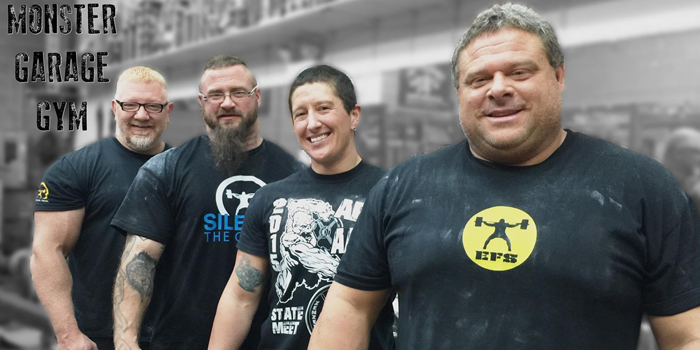
Coauthored by Eric Maroscher and Kristian Johnson
The LA riots took place back in 1992, some 25 years ago. The riots were a reaction to a jury acquittal of four officers in the Rodney King trial regarding excessive force in the videotaped arrest and beating. The trial, the verdict, and the riots split a community among racial lines. During this time virtually all the businesses in the area were closed down and/or boarded up.
During that time, a portion of the LA area was literally ablaze as the riots raged on, with widespread arson, looting, and with property damage estimated over a billion dollars. As the violence subsided and that community assessed the damage, both economic and human (over 2,300 injured, 12,000 arrested, requiring the intervention of the California National Guard, the 7th Infantry, and 1st Marine Division), I remember reading an article somewhere at the time about one of the lone businesses that remained open in the area during the rioting. It was a business where black and white continued on with their “life-routine” as if there was no chaos around them. The business was a local gym where the lifters and bodybuilders continued to train along side one another, within the four walls of their gym, while portions of the city and many, many other businesses literally burned around them.
This was a quarter of a century ago, and although I can’t recall where I read that, what I vividly remember and what has stuck with me all this time is the article identifying that in this society, the gym society, the societal lines were not black and white, but rather big and strong, vs. not big and strong. In other words, the inference was that there is the general society and then there is the lifting society or subculture, which resides within that larger culture. It was that commonality within the serious gym culture of training with weights that superseded, for those lifters in that LA community, what was going on in the world directly around them.
RELATED: 20 Pro Strongman Tips for the Strength Athlete
As a lifelong lifter, like many of you, the existence of this subculture felt very real to me, and was something I was aware of, but it was this article that helped to put my feelings into a focus as I looked out across the gym I was training at back in 1992. The gym I was training at those many years ago was a serious gym and like other serious gyms, was full of a cast of diverse characters, all of different backgrounds, races, and religions, where former inmates trained with current law enforcement and other seemly mix-matched training partnerships were formed. Strength, power and the internal drive to succeed served as the great unifier. The differences within the lifters of that serious gym were varied, but those differences all paled to the commonality that everyone under that roof had. That commonality was that they were there to train and to train hard. This training was the common thread that not only permeated but saturated this gym’s environment and created this subculture of lifters that valued strength, power, and size over the larger societal labels established by the mostly non-training “regular” society as a whole.
I had lived and lifted and trained in this lifting culture my entire life. Although I intrinsically knew and felt this brotherhood of iron, I never actively explored this on a more conscientious level until that LA gym story caused me to pause and reflect. For me, after I became consciously aware of what I already knew intrinsically, I have always relished in that fact and this truth, as I have seen it manifest in every real gym (meaning every serious, or lifter-owned, or hardcore, or what ever vernacular you choose) I have ever trained at or visited.
With this information of the lifting subculture as a context, think about your own life. In your own life, there is the lifting world, and there is the “regular world.” The serious gym culture is the world where you train and push yourself and strive to achieve something that can only be achieved by your own hand, your own work, your own toil, and your own inner drive to continue past and beyond barrier after barrier. The regular world is full of “regular people” who do “regular” everyday things that everyone else can do. These two very different worlds exist in our one larger society. Consider your job. Your workday. During your work day, your job is filled with “regular people” looking at you and questioning with their eyes, your build, your gallon jug of water, your protein shake, the super-sized container of the day’s food, your post-squat limp, your broken blood vessel eyes, etc. You work with the “regular people” in that “regular culture and society” where they, the sheep, often look strangely at you, the shepherd, and your shepherd's staff.
It is this serious-lifters-society that exists this bond that overshadows the things that separate the vast majority of society. When I am in the serious gym today, just like 25 years ago, big and strong and powerful is the bond with others who are big and strong or striving hard to be so. It is this bond—or this “iron subculture” to borrow a term from the awesome podcaster Steve Colescott— that allows lifters to work together in the gym regardless of race, religion, political ideation, or gender identity. If you bench 800 pounds, no other serious powerlifter could care less if you voted for Sanders, Trump, Clinton, or not at all. Other serious lifters couldn’t care less of your race or what gender you identify with. What they care about is the fact that you can press 800 pounds!
In all transparency, I can tell you that I have had training partners that post about their political views as if their view was the only way to view the political landscape. They post to the point where I just click that button and shut their political views off. But regardless of their preachy, “I know what is better for you than even you,” pontifications, when we are at the gym, all talk about anything non-lifting is silenced and the big picture is this: we are brothers in iron and my job is and will be to make sure each lifter has the perfect lift off, the safest spot, and the best feedback on their lifts.
Within the environment of the serious gym, race, religion, political ideation, and gender identity fall a far second to the bond of power and strength and living life to its fullest.
It is the latter on this list of things, gender identity, that typically divides the “regular people,” but for the most part is inconsequential to the serious lifter, and that is the focus of this article today.
This is the story of strongman and powerlifter Kristian Johnson. Kristian is very successful yet undoubtedly the most unknown man on the strongman scene. This is in spite of his amazing feats of strength, years of training, national strongman championships, and a top 10 finish at the prestigious 2017 Arnold.
This is Kristian’s story of transformation. And as Kristian is steeped in the lifting sub-culture, yet works and resides within the larger “non-lifting” culture, his story is being shared here, within his power community, first via elitefts. It is being shared here first because the lifting community as a subculture is Kristian’s family. And first, because the lifting culture is often ahead of the larger American society when it comes to embracing, understanding, or at its barest minimum tolerating the actual essence of a person over the societal labels placed upon a person.
Given all of the stereotypes of the lifting community, it would seem almost counterintuitive that a group of people who spend the vast majority of their free time lifting iron, rep after brutal rep, set after grueling set in the testosterone-laden environment where barbarity appears to rule the day, would be the community to embrace the individual over the label. Yet this is the observation I have made over my decades in the world of highly competitive powerlifting.
At this time I am going to hand my keyboard over for the remainder of this article. And with that said, it is my great honor to introduce to my readers professional strongman Kristian Johnson, and his story of strength, power, and transformation.
Live, Learn and Pass On. Ever Onward.
Monster Garage Gym owner, Eric Maroscher with Strongman Kristian Johnson
“It isn’t about ‘becoming’ another person. I already am who I am. I just want my body to reflect that. It’s not like I’m suddenly changing from the person you’ve always known – this is more about your willingness to see who I’ve always been,” Cooper Lee Bombardier.
On March 21, 2017, I dropped two letters in the mail, one to my mom and one to my dad. My heart sank like a ton of bricks as I heard the envelopes hit the bottom of the giant, metal box, not knowing if I would ever hear from them again. I poured my heart and soul into those letters, putting myself out there in the most vulnerable of ways. I’ve always found it easier to say things in writing, especially the hard things. After 34 years of living in a shell, I never felt comfortable in, I was writing to tell my parents that I have finally started the process of becoming the person I have ALWAYS been inside. Here is a summary of what those letters said.
All my life I have felt wrong. And I do mean all my life. Ever since I can remember, before I even knew what gender was, I knew I felt off in my own body. It was as if the world I expected and wanted did not match up with what was going on around me or happening to me. I remember arguing with my dad when I still had training wheels on my bike because I didn’t want to wear a shirt but he insisted I had to. I remember throwing a fit when my mom’s best friend wanted me to be her flower girl, and I was ecstatic when I got to wear a tiny tux as the ring bearer. I responded to a comment, from a female classmate, when we were in kindergarten, about what genitalia I had, because I never thought of myself as a little girl. I was a little boy. I wanted to be called “Cody,” “Shane,” or “Elijah,” when I was very, very young. All these things were before I knew what gender was. All I knew was that in my head, I was a little boy; I hated being called a little girl, and it has been this way for the entirety of my existence.
Imagine, for a second, what that would be like. Imagine waking up tomorrow, in the body of the sex you don't identify with, and being unable to do anything about it. You see the world one way, but you must now live as the opposite, pushed along by what society expects of you, what religion expects of you, what traditional gender roles are expected of you, and an identity that is extremely uncomfortable for you, where you know it’s wrong. Everything about your existence would be laced with lies, and it would feel like there’s nothing you can do about it.
Looking back, when I first “came out,” it was because I thought that was what I had to do. I didn’t realize, precisely, what I was feeling because I figured I was gay; I didn’t know what transgender was. The ONLY reason I thought I was gay was because I was attracted to women. I have never felt like I was gay, and I never identified with the word “lesbian.” It has always made me uncomfortable being referred to with female pronouns, which was especially difficult to handle in the sport of strongman.
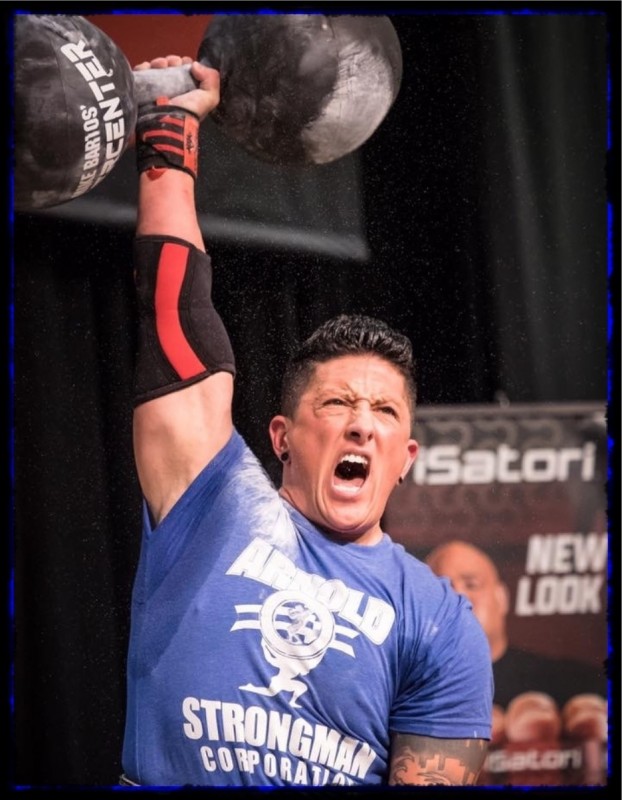
Strongman Kristian Johnson competing at the Arnold
Earlier this year, at the first Arnold Pro Strongwoman Championship, myself, along with nine other competitors, took the stage for two days, making life-long friendships and making history. Going into this event, I knew this was going to be my first and last pro strongwoman competition. The hardest part of the entire weekend wasn’t competing on a stage, in front of thousands of people. It wasn’t pulling and pressing weights I failed at in training. It was being referred to as “she,” “her,” “strongwoman.” It was having to put myself back in the shell I finally busted out of a few months prior. I had to pretend to be someone I wasn’t, keep a smile on my face, all while being a face of a professional
athlete. What kept me going that weekend was seeing how proud my mom was, seeing how proud my girlfriend was, knowing I had an angel (my step dad, who was laid to rest two hours before I got my Arnold invite) looking down on me, who was with me during every event and finally, knowing I had plans to fully start my transition when I got home.
After the first leg of the flight, traveling from Columbus to Jacksonville, I sent an email to my incredible therapist, Kristie Overstreet, saying, “It’s time!” I purposely waited to officially start my transition until after the Arnold, as a way of starting a new chapter in my story. See, I spent my entire life, feeling like there was nothing I could do about what I was feeling and I was terrified to talk to anyone about it. Not surprisingly, this did nothing but hurt me more, making me feel like I was completely alone, and I would never truly be happy. This is not like a habit I can break, a mindset I can force my way out of, or something I can treat with pills from a doctor. This is a genetic construction that will never, ever change. Studies have shown that certain structures of the hypothalamus (what controls some aspects of sexual behavior in the brain) don’t always match up with biological sex. What this means is that my brain resembles a male brain, not my biological sex.
As it turns out, there are things that can be done about how I am feeling, but until very recently, I had been too terrified to make it a reality. It took
time, a lot of time, for me to build up the courage to admit to myself that it would be a mistake to continue living in the shadows, living a lie, with the world seeing me as a female. So, I’m doing something about it, and I am in the process of transitioning from female to male. This is the only thing I can do to ensure there’s nothing holding me back from living my life 100%, and I am thrilled to take it on!
So what does this mean? It means that I will be undergoing hormone replacement therapy, with my doctor. It means that I will undergo the long and tedious process to shift all my identification to reflect my male identity, which includes a name change. Paperwork was filed, with the court, and I am now Kristian Johnson. I wanted to keep my name similar to the name my parents gave me (Kristin), while making it fit me.
Now for the hardest part. This is the part where I want to make it clear that this is not a choice. I am not deciding to become a man. I am allowing myself to be who I am, who I have always been, but I’ve been too scared to admit to myself, and more so to the people I care about. I am done lying about who I am. During and even after my transition, I am going to be opening myself up for discrimination and hate. I could potentially jeopardize my career. I am opening myself up for abandonment and rejection by those I love. I jeopardized losing a partner who loves me, but I have been blessed with the most supportive, accepting, loving partner. And what is very real is that I could potentially jeopardize my life. These are things I would never do if I had a choice. Nobody wants to be a target for discrimination. Nobody wants to be abandoned by the small
circle of people they truly love. This is my next chapter in life, of my existence, and of my development as a human being.
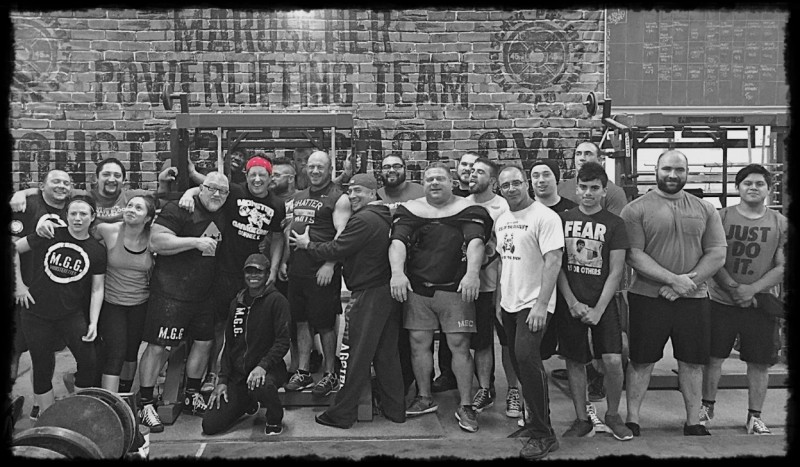
Strongman Kristian Johnson with his Monster Garage Gym lifting family
Coming to grips with this was absurdly hard, and it constantly sent me into depression and loneliness. The bulk of this was initially being figured out when I first moved to Florida in 2015. So, in addition to being away from my family and my friends, the people I love, I was finally seeing myself for who I was. But I was hidden and I was terrified.
When I finally found the courage to tell someone about this, I was vague with what I said because I was so scared. I lied about what made me sad or I just didn’t say anything at all. Coming out and actually telling someone exactly how I was feeling, how I’ve felt for over thirty years, was a prospect far too scary to even consider. Instead of talking, I sank inside myself, jealous of the people that were braver than me. It took feeling completely beat down and hopeless to finally tell someone everything, the raw truth, and that someone was my girlfriend, my rock. It was soon after that that I started working with Kristie, a well-known, amazing therapist. The first session, she told me, “You have been living your life for everyone else. Give yourself permission to live your life for you.” Those words changed my life, and I knew she was right. So now, that’s exactly what I’m doing. I'm giving myself permission and I’m living MY life.
What does all of this have to do with the lifting subculture Eric spoke about? Well, to put it simply, the lifting culture doesn’t care about age, race, sex, religion, political views, sexual orientation, profession, financial status, or gender identity. The lifting culture cares about ensuring each lifter is striving to reach their individual potential, safely, each and every training session.
When I first walked through the doors of Monster Garage Gym, in November of 2013, I knew I was home. I walked in, late on a Sunday morning, and briefly spoke with Eric about pricing and hours. The next day, I walked through those same doors, for my first bench session with the team, and I knew I had found the most supportive, encouraging, strongest, loudest, most tattooed, humble family I have always wanted. MGG is where I was introduced to the sport of strongman and it was pretty much love at first lift. I had been lifting (like a gym bro) for almost ten years, and at the time I was running about sixty miles a week. The combination of lifting odd, heavy things, and cardio was like a dream come true for me.
I competed in my first strongman show in June of 2014, which qualified me for the National Championships. However, I was already registered to run the Chicago Marathon the same weekend so I passed on the opportunity. I competed in a few smaller shows, in addition to powerlifting meets, while continuing to run marathons, until June of 2015 when I won Illinois’ Strongest and got another Nationals invite. The weekend of Nationals, I had just packed my entire life into a moving truck, on its way to Jacksonville, Florida, where I was headed, directly after this competition. It was this competition where I really started to feel uncomfortable, competing with women and being called a “strongwoman.” I always felt uncomfortable competing in the women’s division, in both powerlifting and strongman, but it was this show where it really hit hard that this wasn’t me. The amount of cognitive dissonance I faced was extremely difficult, especially when I continued to do well in competition, leading to an Arnold Amateur Strongman Championship invite in 2016. Part of me wanted, so bad, to say “forget this,” because I felt like I was lying to everyone else, but more importantly, I felt like I was lying to myself. And part of me wanted to continue to compete until I couldn’t anymore, be it physically, mentally or emotionally. See, I love the sport of strongman. I have met and competed against some of the strongest athletes in the world, and I’m honored to call a lot of those people my friends. I have achieved things in my short athletic career that I never dreamed of, making records, breaking records, earning my strongman pro card in August of 2016, and getting the opportunity to compete as one of ten professionals, in the world, at the Arnold Strongman Championships, the first show EVER of its kind — and the last for me.
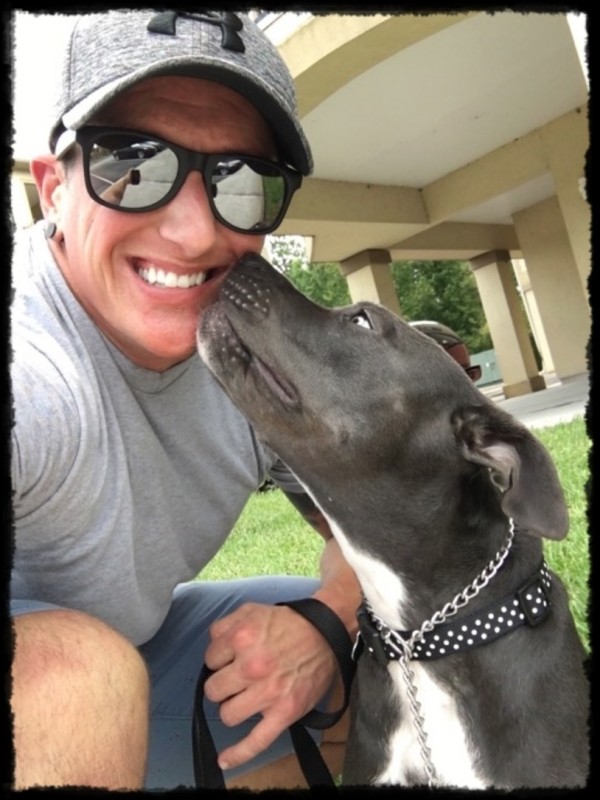
Strongman Kristian Johnson with Bella Fede
So where am I going from here? Well, I’m starting over. I’m starting from scratch, as Kristian, “the most unknown man on the strongman scene.” Will I compete again? It's not a question of “if,” it’s “when.” All I can say for now is that I will be competing in the lightweight men’s open class before the end of 2017, so watch out! Completely starting over, in the novice class, isn’t an option for me, simply because I’m not a novice. To me, I don’t care if I take first or last, if I get all the points or if I “zero” every event. What matters is actually being true to myself, through everything, from here on out.
It's an honor to have the opportunity to share my journey with the world, to educate, encourage, and support anyone working through this as well, personally or as an ally.
I’m beyond excited to show the world what happens when strong is all you can be.
In strength,
Kristian Johnson










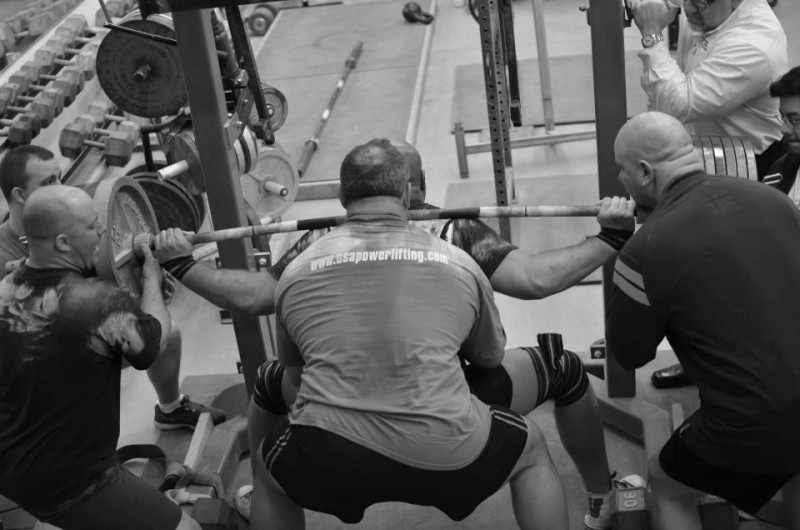
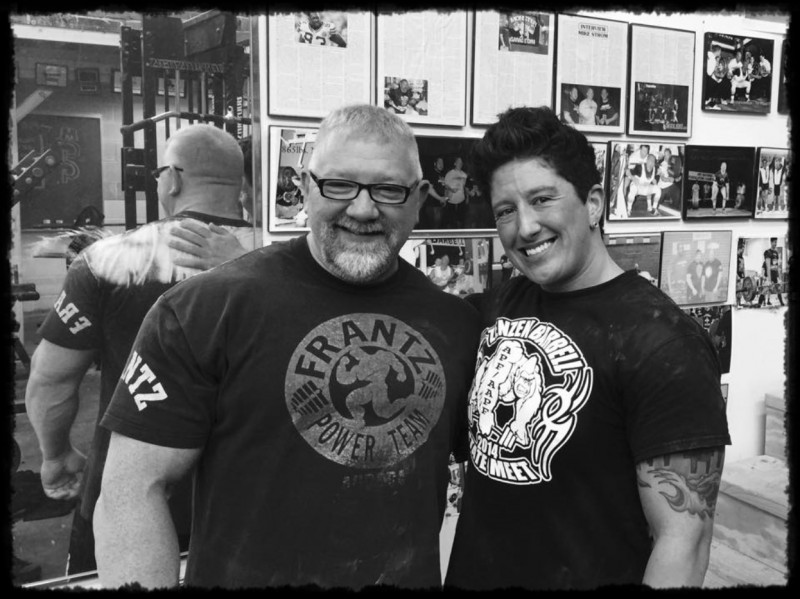

If you really believed that street identity means nothing and should not mean anything within the gym, you wouldn’t post articles like these.
Thank you for this thoughtful article which contains so much wisdom. Kristian thank you also for sharing your journey and I admire your courage for doing so. Eric, you and the Monster Garage Gym family sound like wonderful people, and you are all fortunate to have such a supportive, welcoming environment to train in.
This says it all: "What does all of this have to do with the lifting subculture Eric spoke about? Well, to put it simply, the lifting culture doesn’t care about age, race, sex, religion, political views, sexual orientation, profession, financial status, or gender identity. The lifting culture cares about ensuring each lifter is striving to reach their individual potential, safely, each and every training session."
Kristian, Eric and all the MGM family, I wish you all the best of health as you strive to achieve your goals.
Joe
Getting to watch you compete at the Pro Show at the Arnold this year was incredible. I remember being there behind the curtains of the Rogue stage to handle Jessica Kite, watching you and her and the rest perform feat after feat of strength in front of the roaring crowd under those bright lights. You could feel the energy, the gasps and the cries when lifts were made or lost. I don't remember admiring you for being a strong "woman" - I remember admiring you for your strength and your passion, the grit in your gaze when you were taking the stage. Talking to you, I recall thinking, "Now this is someone I'd like to squat with!".
I loved this article, and continue to be impressed with your inner strength. You ARE the kind of lifter I want to train beside, because we share the same values of strength and perseverance. Thank you for sharing.